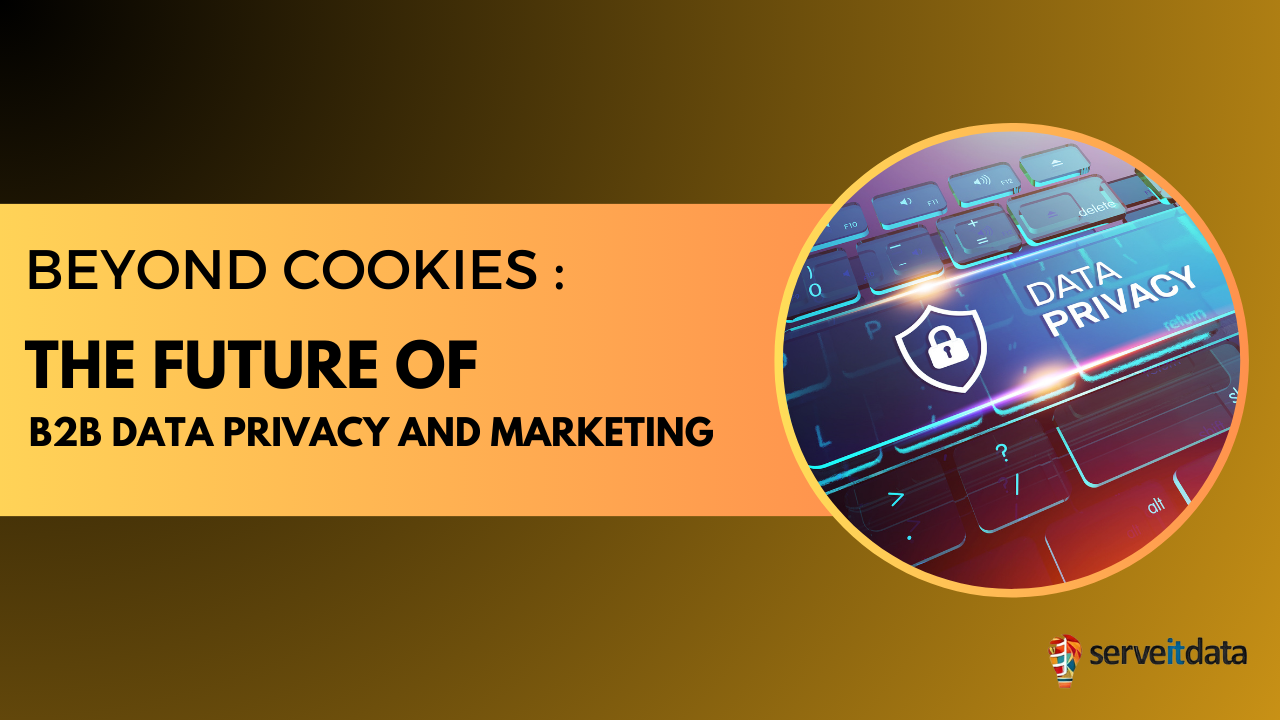Beyond Cookies: The Future of B2B Data Privacy and Marketing
In the ever-evolving realm of B2B marketing, staying ahead means not only keeping up with trends but also navigating complex issues such as data privacy. The landscape of data privacy has undergone a seismic shift, particularly with the phasing out of third-party cookies. This blog will explore the evolving terrain of data privacy and how B2B marketers, like ServeIT Data, are adapting in this post-cookie era.
The Demise of Third-Party Cookies
Third-party cookies have long been the workhorses of digital marketing. They track user behavior across the web, providing valuable insights for marketers. However, they have also raised significant privacy concerns. As a response to these concerns and increased regulations, major web browsers, including Chrome, Safari, and Firefox, have either phased out or announced plans to phase out third-party cookies.
The Impact on B2B Marketing
The disappearance of third-party cookies has substantial consequences for B2B marketers. Here are some of the key impacts:
- Reduced Tracking: Without third-party cookies, it’s more challenging to track users’ activities and gather data about their preferences and behaviors.
- Audience Targeting: Marketers face limitations in targeting specific audiences for ads and content. This impacts the precision of advertising campaigns.
- Measurement Challenges: Metrics like click-through rates and conversion rates may be less accurate due to the limitations in tracking.
- Personalization: Highly personalized marketing efforts, a staple in B2B, become more challenging without granular data.
How B2B Marketers Are Adapting
In response to the evolving privacy landscape, B2B marketers are adapting their strategies. Here are some key approaches:
1. Emphasis on First-Party Data
First-party data, the information that companies collect directly from their audiences, is now more valuable than ever. B2B marketers are actively seeking to collect and leverage this data for better audience insights and targeting.
2. Contextual Advertising
With third-party cookies on the decline, contextual advertising is making a comeback. B2B marketers are focusing on placing ads in contextually relevant environments to reach their target audiences.
3. Data Collaboration
Companies are increasingly collaborating to share first-party data within legal boundaries. Such collaborations can provide richer insights and more effective targeting.
4. Transparent Data Practices
Transparency is becoming a cornerstone of data privacy. B2B marketers are openly communicating their data practices to build trust with their audiences.
5. Enhanced Data Security
Data breaches are costly in terms of both finance and reputation. Marketers are prioritizing data security measures to protect sensitive information.
6. Experimentation with Alternatives
Marketers are actively exploring alternative methods for tracking and targeting, including various technologies that respect user privacy.
Navigating the Post-Cookie Era
The post-cookie era doesn’t mean the end of effective B2B marketing; it signals a transformation in the way it’s done. B2B marketers like ServeIT Data can navigate this new terrain with a few key strategies:
1. Customer-Centricity: Focus on understanding your customers better than ever. Collect, manage, and leverage first-party data to create customer-centric marketing strategies.
2. Quality Content: Invest in creating high-quality, engaging content that resonates with your audience. In the absence of granular tracking, compelling content becomes more critical for attracting and retaining customers.
3. Contextual Relevance: Place your content and ads in contextually relevant environments. Ensure that what you offer aligns with the interests and needs of your audience.
4. Compliance and Ethics: Stay updated on data privacy regulations and ensure your practices are compliant. Ethical data handling is not just a legal requirement but a trust-building measure.
5. Experiment and Innovate: The post-cookie era is a time for experimentation. Be open to trying new technologies and strategies that respect user privacy while achieving your marketing goals.
In conclusion, the post-cookie era presents challenges and opportunities for B2B marketers. It’s a time to refocus on customer-centric strategies, data transparency, and ethical practices. By adapting to this evolving landscape, B2B marketers like ServeIT Data can continue to thrive in the digital world while respecting user privacy and data ethics. The future of B2B marketing will be shaped by those who can embrace these changes effectively.


